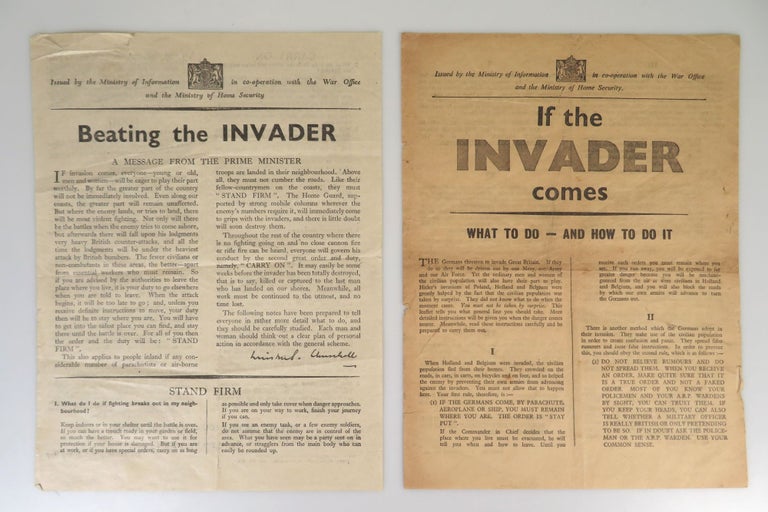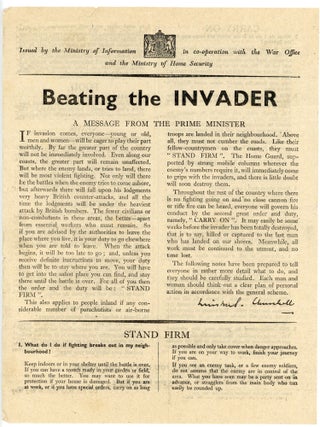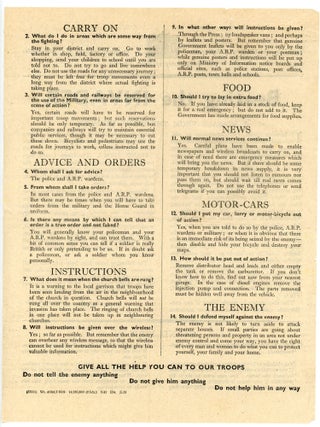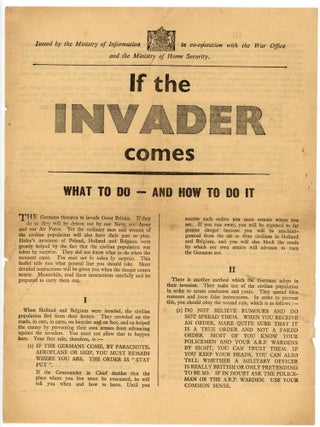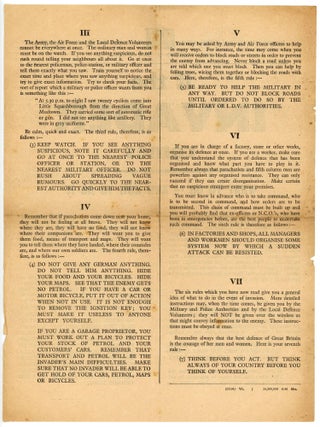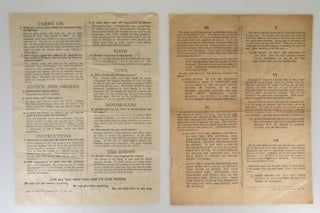If the Invader Comes & Beating the Invader
London: British Ministry of Information, War Office, and Ministry of Home Security, 1941. First edition. Leaflet. "If invasion comes, everyone - young or old, men and women - will be eager to play their part worthily."
This pair of original leaflets issued by the British Government early during the Second World War testify to the very real peril faced by Britain during the first year of Winston S. Churchill’s wartime premiership. The war’s outcome is now long-settled history, making it perhaps difficult to viscerally understand the credible, imminent threat of Nazi invasion at the time.
These leaflets make the point. They are titled If the INVADER Comes and Beating the INVADER, issued respectively in June 1940 and May 1941. Both documents are printed on both sides of a thin sheet of newsprint-quality paper, each measuring approximately 11 inches by 8.25 inches (27.9 x 21 cm). Condition of both documents approaches very good, particularly considering the ephemeral nature of the publication and the inherent perishability of the format. Both feature a single horizontal and a single vertical fold, ostensibly from original mailing, though the Beating the INVADER folds are off center. Both are lightly soiled, age-toned, and show some perimeter wear. If the INVADER Comes is age-toned with fractional chipping along the left and right edges. Beating the INVADER has a .625 inch (1.59 cm) closed tear at the upper left blank margin, with associated creasing, as well as two tiny closed tears along the lower left edge. Both leaflets are quite suitable for framing, either individually or as a pair.
If the INVADER Comes was distributed in June 1940. Hitler’s Germany began its attack against France and the Low Countries on 10 May 1940, the same day Churchill became Prime Minister. Britain had learned from the swift fall of Holland and Belgium when “the civilian population fled” and “crowded on the roads, in cars, in carts, on bicycles and on foot, and so helped the enemy by preventing their own armies from advancing against the invaders.” This leaflet is a protracted admonition not to panic and to help the cause. Six rules with Roman numerals are articulated: stay put, do not believe or spread rumors, note and report anything suspicious, do not give any German any material or informational aid, be ready to assist the military if asked, and organize or participate in a plan to resist attack. The document closes with a stern and somber admonition to “THINK ALWAYS OF YOUR COUNTRY BEFORE YOU THINK OF YOURSELF” – an interesting, dark rhetorical inversion of future President Kennedy’s famous inaugural exhortation “ask not what your country can do for you – ask what you can do for your country.”
Beating the Invader, issued nearly a year later, has a similarly themed but more granular set of instructions, but there are interesting differences. First and foremost, Churchill himself wrote the introduction to this leaflet, taking up two-thirds of the first page, headed “A MESSAGE FROM THE PRIME MINISTER and terminating with his facsimile signature. Though the tone remains stern and the situation dire, the message – beginning with the title of the leaflet – is subtly more resolute and less desperate. There are now fourteen points in Q & A format instead of six “instructions”. One gets the feeling that much had been learned since the preceding leaflet, and that a firm, composed hand was now on the tiller. The leaflet was prepared by the Ministry of Information and forwarded to Churchill on 7 March 1941. Churchill dictated his introduction on 25 March. After sober consideration of the timing and effect of such a message to the British people, the War Cabinet decided on April 24, 1941 to print more than 14 million copies and distribute the leaflet to all British households. Bibliographer Ronald Cohen writes: "The huge print run might leave one with the impression that the leaflet would be commonly found today. It was, however, only a leaflet anticipating an event that never came to pass. Few copies have survived."
Reference: Cohen B76, Woods A69. Item #007297
Price: $700.00

